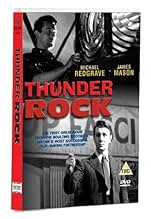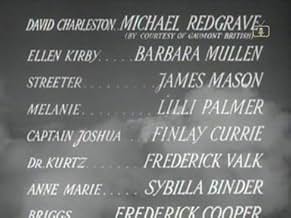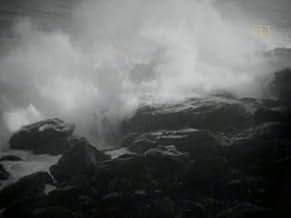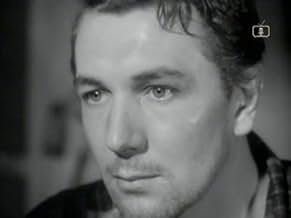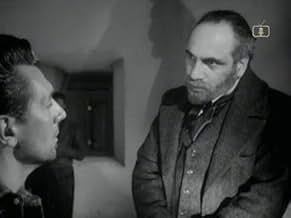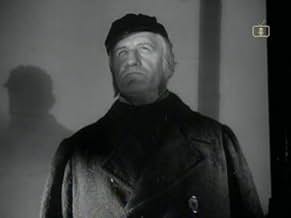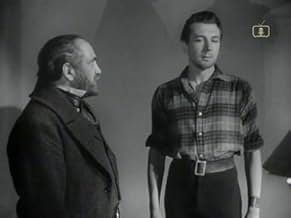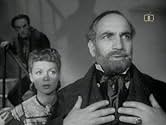Cynical, embittered newspaperman David Charleston (Michael Redgrave) is tormented, then inspired, by visions he keeps having of people who have drowned.Cynical, embittered newspaperman David Charleston (Michael Redgrave) is tormented, then inspired, by visions he keeps having of people who have drowned.Cynical, embittered newspaperman David Charleston (Michael Redgrave) is tormented, then inspired, by visions he keeps having of people who have drowned.
- Awards
- 1 win total
Bryan Herbert
- Flanning
- (as Brian Herbert)
Featured reviews
Holy sh*t, was this a peculiar movie! Slow moving but oddly compelling look at a writer's psyche. A war correspondent desperately wants to awaken Britain's awareness of fascism and the inevitable war and dismally fails -- and this is all shown in flashback. The correspondent is shown as an isolated fellow in a lighthouse on the Great Lakes, post-war, who becomes obsessed with the story of drowned immigrants who never reach the lighthouse a hundred years before (get the connection?), dying at sea. And the story then becomes what he imagines their lives to have been, growing in complexity and realism as he comes to terms with his own defeats. I've never seen the writing process so accurately shown in a film as he talks to the characters in his mind and continues to revise their lives before our eyes. An ambitious film that doesn't entirely work, but that I found fascinating and moving. Michael Redgrave is terrific, too, and James Mason, who appears too briefly, has a really cute wave in his hair (ha).
All the reviewers who wished they could see this film again (some of whom saw it originally in 1942!), can now see it again if they are resident British and subscribe to Freeview tv on Channel 81 It is shown regularly on this wonderful channel which I constantly watch if you can put up with the adverts which finances it, as it saves paying for numerous dvds which I used to do before I discovered this tv station.For example, every Sunday @ 9.p.m. GMT they are repeating the wonderful mid 60s episodes of "The Human Jungle" starring Herbert Lom which I originally saw when it was transmitted (I am now 72).
Some reviewers thought Thunder Rock was too stagey.Does it matter? I saw the classic R.C.Sherriff's "Journey's End" on Youtube the other day which of course is based on his play.What if Michael Redgrave is a bit declamatory at times, he was an accomplished stage actor first.In 1942 Britain was in a precarious position so of course the Government sought propaganda films to help morale & the war effort.See this film on the aforesaid channel, the tv station is bound to repeat it occasionally.
Some reviewers thought Thunder Rock was too stagey.Does it matter? I saw the classic R.C.Sherriff's "Journey's End" on Youtube the other day which of course is based on his play.What if Michael Redgrave is a bit declamatory at times, he was an accomplished stage actor first.In 1942 Britain was in a precarious position so of course the Government sought propaganda films to help morale & the war effort.See this film on the aforesaid channel, the tv station is bound to repeat it occasionally.
I saw this movie in 1942, when I worked for the War Department and had just enlisted in the Army Air Corps, so this might account for the strong memories I have of it.
I was a little shocked that it seemed almost pure propaganda. However, it was clearly made for a British audience at a time when the nation was in imminent danger of invasion by the Nazis. Its message was never to give up hope.
It opens with the hero being frightened by the spread of Fascism across Europe. He goes into a London movie house where the depressing newsreel is followed by a cartoon which the unthinking audience finds hilarious. Disgusted, he gives up and withdraws into himself. He becomes a sort of hermit and somehow gets a job as a lighthouse-keeper on the Great Lakes.
Browsing through the lighthouse's log, he finds an account of a shipwreck. As he reads, the viewer notices that the lighthouse's central pole is now at an angle--a very clever hint of the transition to the fantasy now taking place. He is now on board the sinking ship and all is confusion and despair. But it turns out OK--the first example of the message (to the English) not to give up hope.
There are several other such episodes including one about the doctor in Vienna who discovers that doctors not washing their hands is how the deadly childbirth fever infection is spread. A failure, he is laughed out of town. But a few years later his radical theory is proved correct. Another morale boost for the discouraged wartime English.
I can't remember how the movie ends--but I've never forgotten the movie!
I was a little shocked that it seemed almost pure propaganda. However, it was clearly made for a British audience at a time when the nation was in imminent danger of invasion by the Nazis. Its message was never to give up hope.
It opens with the hero being frightened by the spread of Fascism across Europe. He goes into a London movie house where the depressing newsreel is followed by a cartoon which the unthinking audience finds hilarious. Disgusted, he gives up and withdraws into himself. He becomes a sort of hermit and somehow gets a job as a lighthouse-keeper on the Great Lakes.
Browsing through the lighthouse's log, he finds an account of a shipwreck. As he reads, the viewer notices that the lighthouse's central pole is now at an angle--a very clever hint of the transition to the fantasy now taking place. He is now on board the sinking ship and all is confusion and despair. But it turns out OK--the first example of the message (to the English) not to give up hope.
There are several other such episodes including one about the doctor in Vienna who discovers that doctors not washing their hands is how the deadly childbirth fever infection is spread. A failure, he is laughed out of town. But a few years later his radical theory is proved correct. Another morale boost for the discouraged wartime English.
I can't remember how the movie ends--but I've never forgotten the movie!
That this story is an allegory is clear from very early on but the director seems to have wanted to disguise it somehow with unnecessary padding. In doing so he detracts from the overall message and loses his audience a little along the way. Take the opening scenes as an example where a phone call is passed higher and higher through a chain of employees. It's well played, well acted and amusing and of absolutely no relevence whatsoever to the plot. You may as well have had a Donald Duck Cartoon instead and started the film where James Mason lands at the lighthouse.
It achieves some great moments both in and out of it's lighthouse setting, Michael Redgrave is very good but everything just goes on that little bit too long for it's own good.
James Mason stardom puts him near the top of the billing, but he's really only a bit player in this and doesn't make any significant contribution to the overall film.
It achieves some great moments both in and out of it's lighthouse setting, Michael Redgrave is very good but everything just goes on that little bit too long for it's own good.
James Mason stardom puts him near the top of the billing, but he's really only a bit player in this and doesn't make any significant contribution to the overall film.
Based on a play, "Thunder Rock" is a 1942 film that follows the fascination with ghosts that seems prevalent at the time, just as it is prevalent in ours. There was "Between Two Worlds," which was the remake of "Outward Bound," "The Ghost and Mrs. Muir," "Heaven Can Wait," "Here Comes Mr. Jordan," - etc.! I won't go into the angels - "It's a Wonderful Life," "The Bishop's Wife," etc. The war caused people to think about death and the afterlife a great deal.
"Thunder Rock" is about a newspaperman David Charleston, (Michael Redgrave) who saw the rise of Fascism and Nazism and tried to warn people to wake up and take action. Unfortunately, his editors wouldn't allow the doom and gloom. His response is to give up and take a job as a lighthouse keeper on Thunder Rock in Lake Michigan. There, he becomes interested in a ship's log of a ship that went down 90 years earlier. He begins to have conversations with them in his mind. None of the passengers know they're dead except for the captain (Finlay Currie). He shows David how each of these people came to be on the ship. There's a doctor driven out of Vienna for using an early form of anesthesia (Frederick Valk), an early feminist (Beverly Mullen) jailed repeatedly for her views, a man and his wife en route to America to try for a better life for their family.
There are several themes present in this film - the themes of keeping hope, not giving up one's quest, and affirming life, certainly important ideas in a time of war. There's also the theme of reincarnation, as one of these people could have been Charleston. In the beginning of the film, there is the communication of information from one person to another to another to another, as knowledge is passed through generations.
Redgrave is excellent, as are Finlay Currie, Beverly Mullen, James Mason (as David's friend) and a young Lili Palmer as the doctor's daughter. In fact, the whole cast is good, including a young Barry Morse in his pre-"The Fugitive" days, as the ex-fiancée of Beverly Mullen.
Beautifully photographed and thought-provoking.
"Thunder Rock" is about a newspaperman David Charleston, (Michael Redgrave) who saw the rise of Fascism and Nazism and tried to warn people to wake up and take action. Unfortunately, his editors wouldn't allow the doom and gloom. His response is to give up and take a job as a lighthouse keeper on Thunder Rock in Lake Michigan. There, he becomes interested in a ship's log of a ship that went down 90 years earlier. He begins to have conversations with them in his mind. None of the passengers know they're dead except for the captain (Finlay Currie). He shows David how each of these people came to be on the ship. There's a doctor driven out of Vienna for using an early form of anesthesia (Frederick Valk), an early feminist (Beverly Mullen) jailed repeatedly for her views, a man and his wife en route to America to try for a better life for their family.
There are several themes present in this film - the themes of keeping hope, not giving up one's quest, and affirming life, certainly important ideas in a time of war. There's also the theme of reincarnation, as one of these people could have been Charleston. In the beginning of the film, there is the communication of information from one person to another to another to another, as knowledge is passed through generations.
Redgrave is excellent, as are Finlay Currie, Beverly Mullen, James Mason (as David's friend) and a young Lili Palmer as the doctor's daughter. In fact, the whole cast is good, including a young Barry Morse in his pre-"The Fugitive" days, as the ex-fiancée of Beverly Mullen.
Beautifully photographed and thought-provoking.
Did you know
- TriviaBarbara Mullen (Ellen Kirby) was playing a forty-year-old spinster, yet, she was only twenty-eight.
- GoofsDuring the flashback sequence, when "Briggs" walks back into the room to his family, a crew member's hand can be seen outside the door stopping it from slamming shut.
- ConnectionsReferenced in Portrait of Jennie (1948)
Details
- Release date
- Country of origin
- Language
- Also known as
- The Charter Film Production of Thunder Rock
- Filming locations
- D&P Studios, Denham, Uxbridge, Buckinghamshire, England, UK(studio: made at D & P Studios Denham - England)
- Production company
- See more company credits at IMDbPro
- Runtime
- 1h 30m(90 min)
- Color
- Aspect ratio
- 1.37 : 1
Contribute to this page
Suggest an edit or add missing content

